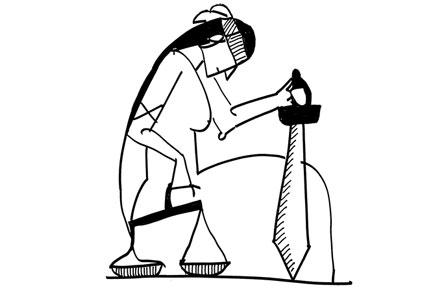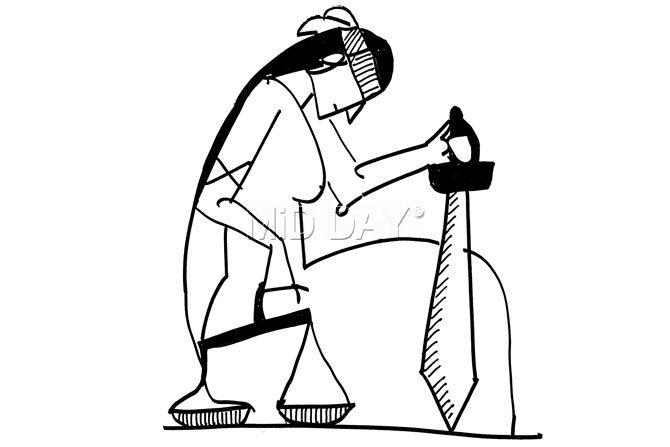In most courtrooms built in the colonial period, we see the image of a woman with a blindfold balancing scales in her arms.

In justice we trust
 In most courtrooms built in the colonial period, we see the image of a woman with a blindfold balancing scales in her arms. This is Lady Justice based on a Greek goddess described in Hesiod’s Theogony called Dike, daughter of Zeus, who is associated with human while her mother Themis is associated with divine justice. In art, she was shown bearing scales. Her Roman form, Justitia, was blindfolded. She was imagined as innocent looking, throttling the ugly Adikia (injustice) and beating her with a stick, or killing her with sword. The story goes that she lived with humans in the Golden and Silver Age, when there were no wars. But then humans grew greedy and justice was forgotten and Dike ran away to be with her father, high on Mount Olympus, away from human corruption.
In most courtrooms built in the colonial period, we see the image of a woman with a blindfold balancing scales in her arms. This is Lady Justice based on a Greek goddess described in Hesiod’s Theogony called Dike, daughter of Zeus, who is associated with human while her mother Themis is associated with divine justice. In art, she was shown bearing scales. Her Roman form, Justitia, was blindfolded. She was imagined as innocent looking, throttling the ugly Adikia (injustice) and beating her with a stick, or killing her with sword. The story goes that she lived with humans in the Golden and Silver Age, when there were no wars. But then humans grew greedy and justice was forgotten and Dike ran away to be with her father, high on Mount Olympus, away from human corruption.

Illustration/Devdutt Pattanaik
ADVERTISEMENT
The idea of associating justice with scales is much older though and can be traced to the Egyptian Goddess of justice, Maat, and later Isis. The feather of Maat was used to weigh the heart of the dead, to see if they were worthy of entering the land of Osiris, or if a monster should simply eat them, depriving them of the afterlife. The idea spread from Egyptian mythology through Greek mythology to Christian mythology with the Archangel Michael often shown holding scales. Sin makes the heart heavy, and causes the sinner to be cast in Hell. The virtuous go to heaven.
Of course, in India, we are slowly resigning to the idea that the rich, the powerful, the famous are usually seen as innocent, and go to heaven. Allegedly, the judges of our courts seem eager to forgive, going through heaps and heaps of evidence to find a flaw either in data or process, a benefit of doubt denied to those without lawyers, without connections, without wealth. Perhaps that is why the blindfold. It must be frustrating for judges of lower courts to find their judgments being suspended and overturned by the judges of the ‘higher’ courts. A kind of judicial feudalism, if one thinks about it. But then criticising courts is akin to blasphemy, for the courts and the judicial systems were designed based on assumptions of Abrahamic mythology where fear of God’s fire and brimstone is supposed to keep humanity from committing evil, and where God/Judge is never wrong.
The blindfold was meant to show equality before the law, as before the eyes of God, for did not Jehovah punish his prophet Moses and his king David for breaking just one law? Humans hope for a world where the crime is seen without factoring in the estate or titles of the accused. But that remains more aspirational than real.
In many ancient societies, the stature of the man and woman is always considered while dispensing justice, looking at the larger narrative at stake. In many societies, if a rich man killed poor man, the rich man was asked to pay the poor man a hefty fine, thus pragmatism overshadowing vengeance. In Manu Smriti, caste determines the intensity of punishment. The scale of justice was in many societies meant to balance good deeds against the bad. If the good deeds were greater than the bad deeds, then there was a lesser punishment, as compared to when the bad deeds were greater than the good deeds. This accounting method of justice is found in many ancient societies, including India, where Chitragupta, the scribe of Yama, maintains an account of equity-generating actions (punya) and debt-generating actions (paap). This belief perhaps accounts for the temple-going and charitable deeds that the accused in India indulge in, rather publicly, before the Day of Judgment, when judges seem to be increasingly turn into loving saviors rather than upright angels, and the accuser, and the policemen, feel like idiots for trusting the system.
The author writes and lectures on relevance of mythology in modern times, and can be reached at devdutt@devdutt.com
The views expressed in this column are the individual’s and don’t represent those of the paper.
 Subscribe today by clicking the link and stay updated with the latest news!" Click here!
Subscribe today by clicking the link and stay updated with the latest news!" Click here!







